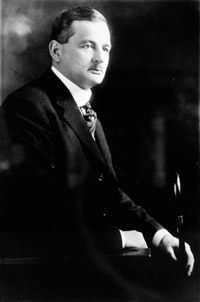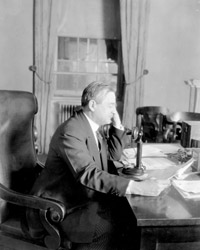Governor: 1925-1929
See also: Angus Wilton McLean, Dictionary of North Carolina Biography, Margaret McLean

With a background in finance and business, Angus Wilton McLean (1870-1935) introduced into state government sound fiscal management, substantially revising the budget process and reorganizing state agencies. The “Businessman’s Governor” was of Scotch ancestry and developed an interest in genealogy; his research was published posthumously by terms of a bequest in his will. He was born on April 20, 1870, in Robeson County to Confederate veteran and farmer Archibald McLean and the former Caroline Purcell. On graduation from local public schools and McMillan Military Academy, young McLean studied law beginning in 1890 at the University of North Carolina. In 1892 he was admitted to the bar and joined a practice in Lumberton. McLean married Margaret French in 1904; they had three children.
In addition to his legal pursuits McLean was among Lumberton’s leading businessmen, involved with the founding of the town’s first bank, three textile mills, and the Virginia and Carolina Railroad, which he served as president. Long active in the Democratic Party McLean served on the state executive committee and as a delegate to national conventions. In 1919 President Woodrow Wilson appointed him one of four directors of the War Finance Corporation; in 1920 the President named him Assistant Secretary of the Treasury. McLean, with the support of the political machine of Senator Furnifold Simmons, defeated Josiah Bailey for the Democratic gubernatorial nomination in 1924 and in the fall easily defeated Republican Isaac M. Meekins.
In his inaugural address McLean recommended thorough revision of the budget system for state government. A month later the legislature adopted his plan making the governor the head of the Advisory Budget Bureau in charge of preparing a biennial budget.

The Department of Revenue was created during McLean’s term. A daily deposit system enacted by the legislature required the direct deposit of all state funds in order to reap the maximum interest. In the campaigns with Bailey and Meekins attention had been drawn to the bonded debt accumulated under Governor Morrison. With conservative management of the revenue McLean concluded his term with a $2 1/2 million surplus, a cushion which would aid his successor during the Depression.
McLean continued the highway improvements initiated by his predecessor, with new bond issues of $20 million issued in 1925 and $30 million in 1927. During his term of office the Department of Conservation and Development replaced the old Geological and Economic Survey. That agency, the duties of which have since been assumed by successor departments, promoted economic development and the protection of natural resources. The Corporation Commission was established to supervise the regulation of business. A classification system and uniform wage and salary schedule were put in place for state employees. At the recommendation of the governor the General Assembly enacted laws to change the structure of county government, with budgetary procedures and roles for commissioners defined by law. McLean withheld his support from progressive labor measures, among them bills to secure workmen’s compensation and extended child labor legislation. An avid outdoorsman, McLean was the first modern Chief Executive to leave the state for extended stays. The first statewide game law was passed during his administration. McLean in 1927 endorsed the legislation necessary to establish the Great Smoky Mountains National Park.
Upon the conclusion of his term as governor McLean returned to his law practice in Lumberton and soon opened a second office in Washington, D.C. In deference to his friend Furnifold Simmons he declined to run for the U.S. Senate in 1930. In April 1935 he suffered a stroke in the Capital City and died two months later on June 21, 1935. His body was returned to Lumberton for burial.